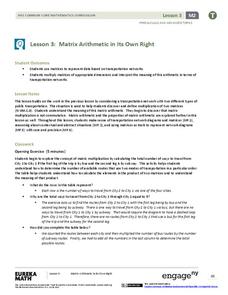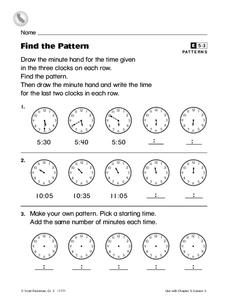Willow Tree
Line Plots
You can't see patterns in a jumble of numbers ... so organize them! Learners take a set of data and use a line plot to organize the numbers. From the line plot, they find minimum, maximum, mean, and make other conclusions about the data.
Concord Consortium
Integer Solutions
Experiment with integer relationships. Young scholars consider integers that have a sum of 10. They begin with two integers, then three, four, and more. As they consider each situation, they discover patterns in the possible solutions.
John Lentine
Butterflies and Bugs
Symmetry, line, shape, art, and math are all connected through a fun hands-on craft. Included are instructions to a classic activity, where learners create butterflies to show symmetry in nature and then discuss symmetry in math. It is...
Virginia Department of Education
Integers: Addition and Subtraction
Young mathematicians construct their own understanding of integers with an inquiry-based math lesson. Using colored chips to represent positive and negative numbers, children model a series of addition and subtraction problems as they...
Curated OER
Linear Programming
Students explore inequalities to determine the optimal solution to maximize a profit for a company. In this linear programming lesson plan, students discover how to graph inequalities and how to determine the algebraic representation of...
EngageNY
Matrix Arithmetic in Its Own Right
Matrix multiplication can seem random to pupils. Here's a instructional activity that uses a real-life example situation to reinforce the purpose of matrix multiplication. Learners discover how to multiply matrices and relate the process...
Curated OER
Multiplying by 10
Multiplying by 10 is simple, but do your scholars know the trick? They look at four examples; if you haven't learned this yet, see if they notice a pattern in these answers. They multiply 70 numbers by 10. Most are two-digit, but a few...
Virginia Department of Education
Types of Variations
Scholars determine how two quantities vary with respect to each other. They complete a fill-in-the-blank activity by stating whether the entities vary directly, inversely, or jointly, create equations that match different variations, and...
02 x 02 Worksheets
Inverse Functions
Young mathematicians look for patterns in inverse functions as they relate to the original functions. The comprehensive lesson emphasizes vocabulary throughout as well as algebraic and graphical characteristics of the inverse functions.
Illustrative Mathematics
The Stamp Collection
By using language like "half of the stamps," children are exposed to patterns in arithmetic that requires solving a two-step word problem. This type of language opens a new door for transitioning learners toward understanding fractions...
CK-12 Foundation
Inequalities that Describe Patterns: Freezing Cold Comparison
Don't freeze out the interactive on inequalities from your lesson plans. Young mathematicians use an interactive thermometer and number line to compare freezing temperatures. Inequalities help express these comparisons.
Illustrative Mathematics
Eight Circles
We are used to finding the area of a circle by plugging the radius into an equation. Here, learners are required to go further to find multiple areas and calculate the difference. They must detect a pattern in order to figure out the...
CK-12 Foundation
Adding and Subtracting Matrices: The Matrix Calculator
Discover the procedure to add and subtract matrices. Pupils use the interactive and discover the pattern in adding and subtracting matrices. Scholars adjust the entries in the addends and see the resulting changes in the sum. They also...
Curated OER
There's Gold in Them Thar Ratios
Students draw a model of the bunny problem which generates the Fibonacci Sequence, spirals generated from golden rectangles and golden triangles; identify the golden ratio in the human body, and find the Fibonacci numbers in nature.
Curated OER
Getting in Shape Again
Students create rocket shapes out of pattern blocks. They draw a picture of a rocket, build a pattern block rocket following simple directions, and complete a graph of the shapes used.
Curated OER
Patterns
Students extend, generalize, recognize, and write a variety of patterns using an AppleWorks template and the Inspiration or Kidspiration educational software. This technology-based math lesson is intended for the early elementary classroom.
Curated OER
Investigation - Patterns
Students create a pattern out of pattern blocks. In this math lesson, students work with a partner to investigate the pattern they have. Within that group, students continue to design the pattern by adding the next two pieces....
Curated OER
Put Patterns to Work for You!
For this patterns worksheet, students complete multiplication charts and division problems to solve pattern problems. Students complete 11 problems total.
Curated OER
In and Out Function Problems
Third graders solve In and Out function problems. They analyze a chart and discuss the steps to solving the functions, and discuss the patterns and complete the charts. Students then create a book of repeating patterns using magazines,...
Curated OER
Pattern Block Design
In this using pattern blocks to create a design worksheet, students read and apply criteria to create a design with pattern blocks, trace it, and draw lines of symmetry. Students complete four pattern block activities.
Curated OER
Find the Pattern
In this pattern worksheet, students complete 4 different patterns involving elapsed time where they examine 3 clocks on each problem and then determine the next clock in each pattern.
Curated OER
Part Patterns
In this patterns worksheet, 3rd graders study and analyze the 6 patterns on the left of the worksheet. Students then look at the pictures on the right and circle the picture that comes next.
Curated OER
Find the Pattern
In this clock patterns worksheet, 2nd graders draw the minute hand for the time given in the three clocks on each row of clocks. Students find the pattern and then draw the minute hand on the last two clocks in each row. Students make...
Curated OER
Finding Patterns
In this finding patterns activity, students analyze the 6 numbers in a box. Students put an X on the number that does not belong and write the others in a pattern. There are 4 questions on the page.
Other popular searches
- Growing Patterns in Math
- Number Patterns in Math
- Geometric Patterns in Math
- Pasta Patterns in Math
- Increasing Patterns in Math
- Patterns in Math Quiz
- Repeating Patterns in Math
- Color Patterns in Math
- Identifying Patterns in Math
- Nature's Patterns in Math

























